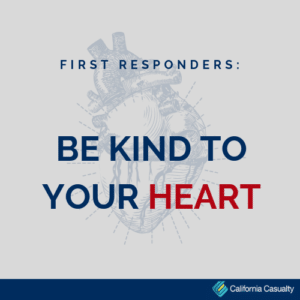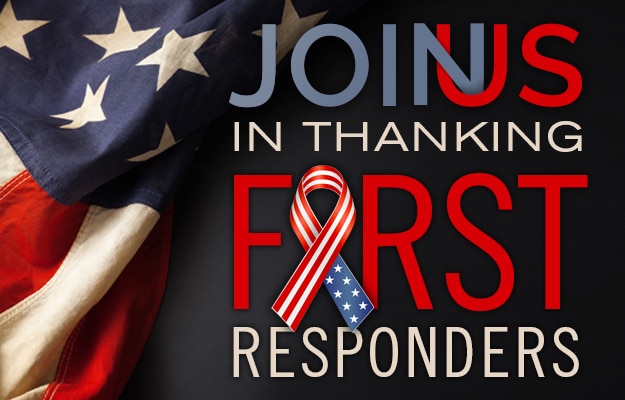by California Casualty | Firefighters, Health, Peace Officers |
The men and women of public safety are tough, in control, and working to put others ahead of themselves. It takes a lot of “heart” to do the job. If you wear a uniform, be aware that your risk of heart disease might be higher than the general population.

February is Heart Month – a reminder that we all need to take care of our hearts so we will be around to celebrate many more Valentine’s Days with our loved ones.
The Risk
Being a first responder is one of the most stressful jobs in the U.S. Long shifts, life and death situations, and strenuous physical exertion can take a toll on the heart. A number of studies involving law enforcement officers found sudden cardiac deaths accounted for 10 percent of all on-duty police deaths in the U.S.
Cardiovascular disease was found to be the primary on-duty and lifetime mortality risk for firefighters.
The danger increased for first responders who were diabetic, overweight, smoked, used excessive alcohol and didn’t exercise.
Female officers, firefighters and EMTs also need to pay attention. Their rates of heart disease and heart attack have increased, and the Centers for Disease Control lists heart disease as the leading cause of death for women in the U.S.
Recommendations
While we may not be able to reduce the stress involved with public safety, there are clear steps that can cut your risk of heart disease:
- If you smoke, quit
- Improve and control cholesterol levels
- Reduce high blood pressure
- Exercise
- Eat a heart-healthy diet
- Get to a healthy weight
- Get adequate sleep
- Reduce alcohol intake
- Begin aspirin therapy
Police and fire organizations are now calling for mandatory medical exams, wellness and fitness requirements and annual physical fitness performance evaluations. They also recommend that individuals buddy-up and create workout groups, walking clubs and other physical challenges in for their departments.
Law enforcement officers can find heart-healthy tips at https://www.officer.com/command-hq/supplies-services/healthcare/article/20998653/heart-disease-and-law-enforcement.
Firefighters can go to https://healthy-firefighter.org/.
by California Casualty | Peace Officers |
You’ve been on patrol for a few years and now you are thinking about moving up the ranks or maybe moving to a bigger department with more opportunities? Your resume can help you stand out above other candidates.
The job search for police officers is not like a normal job search. It’s a different world in law enforcement. You may be looking to make a lateral move in your department or moving to a bigger department where more opportunities are available. Or maybe it’s time to see if you have what it takes to move up in rank? Even though the process is challenging, extensive, and technical, your resume doesn’t have to be. We’ve compiled some easy pointers for you to use to help find the right fit for your resume and your career.
- Don’t worry about the length of your resume. Unless you’re switching careers, your resume will need to hold more information than the customary two pages.
- Write an attention grabbing career objective that should reflect the next rank or position you are aiming for.
- Strive for clarity when explaining your experiences. This can help filter out the least important info the reader needs to see.
- Use action verbs in your descriptions to present a picture to the reader, rather than a list of job duties. Ex: patrolled, inspected, implemented, enforced, assessed, etc.
- If you completed your professional development with the same organization, try lumping the classes you took together to avoid repeating yourself. If you didn’t, just list your training courses with specific organizations, locations, and years.
- When adding your affiliations and community involvements, try only using a few lines and use symbols to separate each listing.
Your resume can be a strong first impression with the right format and verbiage. These tips can help yours stand out from the other candidates. For a resume example, click here. For more law enforcement resume examples and tips, click here.
by California Casualty | Firefighters, Peace Officers |
The words “incomprehensible,” “terrible,” and “devastation like we’ve never seen or imagined” continue to be used to describe the impact of the fires that ravaged and changed the face of Santa Rosa and areas of Sonoma and Napa counties in October. The images of the wind-blown firestorm are seared into our consciousness.
In the aftermath, vast acreage was blackened and trailer parks, hotels and neighborhoods were decimated – leaving our hearts heavy for those who lost family, friends or their homes.
It would have been much worse if not for the heroes who saved countless lives and property. During the firestorm, first responders stood tall as the fury unfolded around them. They made valiant runs into choking smoke and pitch dark conditions to rouse and rescue those caught off-guard, guiding and carrying the infirmed or confused as the relentless inferno consumed everything in its way. They are an inspiration to us all.
Most of those in uniform say they were just doing their job; helping others at their own peril, even while their homes and property were threatened.
As the smoke clears and the damage assessed, we want to thank all the first responders and volunteers who made a difference for so many.
Please join California Casualty in expressing our sincere gratitude to the hundreds of law enforcement officers, firefighters, EMTS and others who put themselves in harm’s way to protect our community. To all our heroes, we appreciate and thank you!

by California Casualty | Peace Officers |
Life as a firefighter, police officer, or paramedic can be stressful and dangerous. Not to mention the long hours and hectic duties, so how do you have time to take care of yourself? Here are five easy ways to make time for self-care and focus on you.
- Get enough sleep. First responders are more likely to suffer from sleep disorders. Getting enough hours of sleep helps your body recover and keeps you mentally focused.
- Exercise regularly. Even though the job includes a lot of moving, lifting, and fast paced action, try to set aside a regular time every day. Find a strength and cardio workout that works best for you.
- Drink plenty of water. Enough water intake isn’t only going to give you energy for the day, but help with your cognitive function.
- Keep a balanced diet. The key to staying healthy is keeping a balanced diet. Switch out processed foods for fresh fruits, vegetables, and whole grains.
- Stop smoking. Continued smoking takes a toll on your cardiovascular health, and it will keep you from performing at your best.
Start making a change to better your lifestyle, improve job performance, and most importantly your physical and mental health.
by California Casualty | Peace Officers |
Policing can be a different story for each rural and urban city. Due to large populations in cities, crime rates tend to be higher versus the countryside, so are we comparing apples to oranges?
Studies show that 80 percent of the U.S. population lives in urban or suburban areas, yet small towns remain attractive to nearly 45 million people. Some say that because of their jobs, families, lifestyle, choosing to live outside the busy urban areas, that the interest of raising a family in a smaller community will be less vulnerable to higher crimes. But did you know that police departments within these rural areas face challenges different from the urban sectors such as:
- Lack of backup officers
- Meeting friends, relatives, and/or neighbors at crime scenes as victims, suspects, and/or witnesses
- Limited peer interaction
As for urban policing, crime is going to occur almost 54 percent more (and growing) than in rural areas. Urban environments commonly have more crimes, like homicide and assault whereas crimes in rural settings tend to be offenses related to agriculture.
These statistics are not to say that policing in one area is better than another, but to show us how different life as an officer across the country can be. All police officers risk their lives for the safety of their communities and for that we can be grateful!
by California Casualty | Peace Officers |
Being a police officer, especially in today’s times, is a very demanding job and with each daily demand comes an attitude that can build negatively after a while. We have some ideas to help change your mindset about how you feel at your job in law enforcement.
A positive attitude can make all the difference in a stressful environment. It’s easier said than done, but having a negative attitude for long periods of time will cause more damage. The right approach can also have a lot of benefits you may not realize.
- Lowers depression
- Lower distress
- Better coping skills in stressful situations
- Increased life span
Try these tips we have to help start a new outlook on being a peace officer.
Work to keep a positive attitude daily. This is going to take practice, but soon it will make a difference. Start your shift with positive self-talk then repeat positive comments to yourself throughout your day.
Set achievable goals. Take a minute to make a list of what you want in life. Include what those goals are that include your family, work, and life in general. Writing these out and seeing them on paper can help take those first steps to achieving your goals.
Start with daily goals. What do you want to accomplish each day? Next, what about one-year goals? Finally, what do you want to see done in 5 years?
By putting all of these tips into practice, your outlook about the job will change. You will discover a new perspective and find the passion of being a peace officer again.


